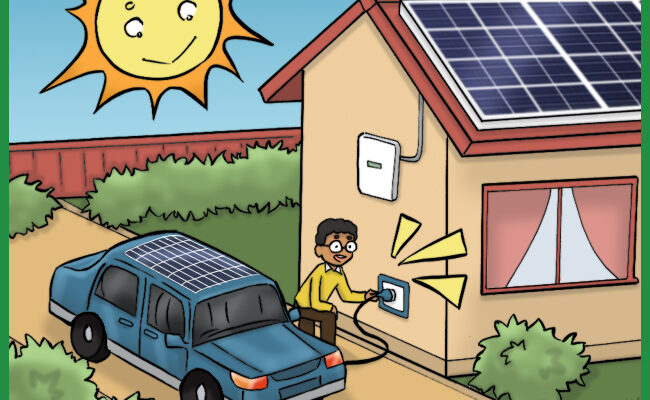In recent years, the automobile industry has undergone a significant transformation, driven by the urgent need for more sustainable transportation solutions. This transformation is marked by the convergence of two innovative technologies: solar power and electric vehicles (EVs). Solar and electric cars hold immense promise for reducing carbon emissions, mitigating climate change, and creating a cleaner, more sustainable future.
Solar power and electric cars make an ideal pairing, offering numerous advantages:
- Clean and Renewable Energy: Solar panels on rooftops or integrated into car designs can harness the sun’s energy to charge EV batteries. Solar energy is clean, renewable, and abundant, providing a sustainable power source that reduces our dependence on fossil fuels.
- Reduced Operating Costs: Solar-charged EVs benefit from significantly lower operating costs. By generating their electricity from sunlight, owners can reduce or even eliminate the cost of charging at public stations or home chargers. This leads to long-term cost savings and enhances economic feasibility.
- Extended Range: Solar panels on cars can contribute to an EV’s range, especially in sunny regions. While they may not fully replace grid charging, solar panels can add extra miles to a car’s range, increasing convenience and reducing range anxiety.
- Environmental Impact: Solar-charged EVs have a reduced carbon footprint compared to their fossil fuel-powered counterparts. By utilizing clean solar energy, these cars help reduce greenhouse gas emissions and air pollution, making our communities healthier and more sustainable.
- Emergency Charging: Solar panels on EVs can provide a source of emergency charging in situations where grid power is unavailable, such as during natural disasters. This added resilience can be crucial in times of crisis.
The future of transportation lies in the convergence of solar and electric cars. As we face mounting environmental challenges, the transition to clean energy sources and sustainable mobility is more critical than ever. Governments, industries, and individuals must collaborate to overcome the challenges associated with solar-charged EVs.
- Government Incentives: Governments can play a pivotal role by offering incentives for solar-charged EV adoption, including tax credits, rebates, and investment in solar charging infrastructure. These policies can accelerate the transition to cleaner transportation.
- Research and Development: Continued investment in research and development is essential to improve the efficiency of both solar panels and EV batteries. Breakthroughs in technology can make solar-charged EVs more practical and affordable.
- Consumer Education: Raising awareness among consumers about the benefits of solar and electric cars is crucial. Educated consumers are more likely to embrace these technologies and make sustainable choices.
Solar and electric cars represent a compelling pathway towards a more sustainable and eco-friendly transportation system. By harnessing the power of the sun to charge electric vehicle batteries, we can reduce emissions, decrease operating costs, and contribute to a cleaner environment. While challenges remain, the promise of solar-charged EVs is too great to ignore. As we move forward, it is essential that governments, industries, and individuals work together to drive this promising technology into the mainstream, creating a future where our cars are not just modes of transportation but also contributors to a cleaner, greener planet.

